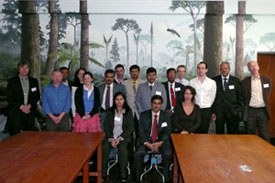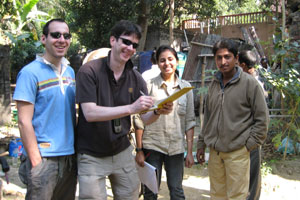Welcome to UKIERI British Council PRAMA Project

Overview
THE UKIERI/British Council funded research project PRAMA: Probabilistic Risk Assessment Modelling for groundwater Arsenic mitigation” is a collaborative partnership between The University of Manchester and the Indian Institute of Chemical Biology. The PRAMA Project was launched at the CSIR-IICB in Kolkata, India on January 18th 2008 and was completed, after receipt of extension dissemination funding in December 2011.
The UK Team Leader is Dr David Polya from EPS’s School of Earth, Atmospheric and Environmental Sciences. The India Team Leader, Dr Ashok Giri from the Molecular and Human Genetics Division of the IICB.
Half Day Dissemination Workshop.
September 21st 2011.
University of Manchester.
Download poster for details.
 Michael Lawson, Professor Chris Ballentine, Debapriya Mondal and Mr Bablu on site in Chakdaha collecting groundwater samples for tritium and C-14 dating and noble gas analysis – these analysis should help understand what the involvement of surface waters is in these shallow aquifers and, particular, if they have any impact of the rates of arsenic mobilization into well waters in West Bengal from the aquifer sediments. Debapriya Mondal, a Dorothy Hodgkins supported PhD student at The University of Manchester is currently on an extended exchange visit to the Indian Institute of Chemical Biology in Kolkata under the auspices of the PRAMA Project – her work is focused on human exposure to groundwater arsenic and water-borne pathogens and probabilistic risk assessment.
Michael Lawson, Professor Chris Ballentine, Debapriya Mondal and Mr Bablu on site in Chakdaha collecting groundwater samples for tritium and C-14 dating and noble gas analysis – these analysis should help understand what the involvement of surface waters is in these shallow aquifers and, particular, if they have any impact of the rates of arsenic mobilization into well waters in West Bengal from the aquifer sediments. Debapriya Mondal, a Dorothy Hodgkins supported PhD student at The University of Manchester is currently on an extended exchange visit to the Indian Institute of Chemical Biology in Kolkata under the auspices of the PRAMA Project – her work is focused on human exposure to groundwater arsenic and water-borne pathogens and probabilistic risk assessment.